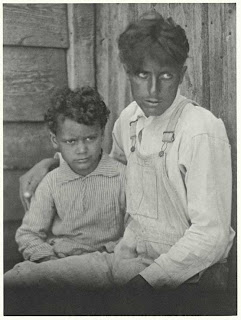In our efforts to complicate "the South" and begin looking at "Souths" that explode a seemingly monolithic tent, I thought I'd introduce you to another group of Southerners you may not be familiar with: the Melungeons.
"Melungeons" refer to groups of Appalachians with African, European, and Native American ancestries.
They were identified by some as Indian, Portuguese, mulatto, Creole, black, or white. Whatever the case, they were--and still often are--called a very "mysterious" people, as their race(s) and "origins" are not easily pinned down. Most were practitioners of various stripes of Protestantism (many were Baptist). Speculations about these populations abound (we like for people and things to have easy and unchanging names, after all). This trailer, apart from bad background music, gives you a sense of all the different ideas on how these groups should be identified:
The convergence of races and regions here offers a nice answer to why it's more than a little tricky to talk about "the South" as a singular experience. Before--and after--something called "the Bible Belt" began to emerge, there were--and are--communities that complicate that very category.


If you want to find out more:
http://www.melungeon.org/node/4
http://www.melungeons.com/articles/jan2003.htm
http://homepages.rootsweb.ancestry.com/~mtnties/melungeon.html
There are lots of other sites too...have some fun with Google and Wikipedia.


I think classifications are completely in the eyes of the beholder. They are generally impossible to make into a science because they take new form when a person with differing views begins to mold their own rules. People were never meant to be sectioned into groups--but it's human of us to need to do that at times. People today are shocked to hear about some of the ways people were classified before the bible belt, but a large part of what we believe was molded by those same people.
ReplyDeleteThis is great! I am so glad you posted this. It is always so interesting to experience different cultures that you were previously unaware of. You're right, there is so much more to "the south" once you look beyond.
ReplyDeleteIt is interesting looking and reading through this article and how they are trying to classify these people into being a mix of races and ethnicities and yet America is supposed to be a melting pot. But is it a true melting pot if we are always trying to classify people into different groups? Why strive for the image of a melting pot and equality if we still feel that one group could be better than another. Maybe this is just my interpretation but this is what I started thinking about when looking over this post.
ReplyDeleteI think this post is very interesting, some of the individuals in the photographs look like my grandparents & great-grandparents. As Reagan mentioned and as I have mentioned in one of my blogs, America is supposed to be this so called "melting pot" but society here is just so hung up on classifications! As far as the melungeons go, I read that most of them were allowed a lot of the same priviledges as whites in the past but on occasion were ostracized for "looking" black. This is a shock in and of itself, because considering the melungeons were of African descent, I am surprised they were even allowed any priviledges because of the "one drop rule".
ReplyDeleteI agree with the idea of America being a melting pot--it is. And yes, Reagan, we're always trying to classify people into different groups. Be it good or bad people do this to identify themselves. I'm not this, this or this, so I must be (insert your own identity here). I think this group is especially interesting in the South because if anyone was going to maintain the differences, it would be the South. Then again, that's probably why most people haven't heard of them.
ReplyDeleteI think there should be only one classification, human. Besides, didn't science show that all mankind in present form originated in and migrated from Africa?
ReplyDeleteI was unaware of that, RK. But its natural for humans to have certain stereotypes and classifications of people. Its impossible to group us all together in one neat division of "human".
ReplyDeleteRyan is right. According to science and theories of the creation of man, humans originated in Africa.
ReplyDeleteWhy is it impossible?